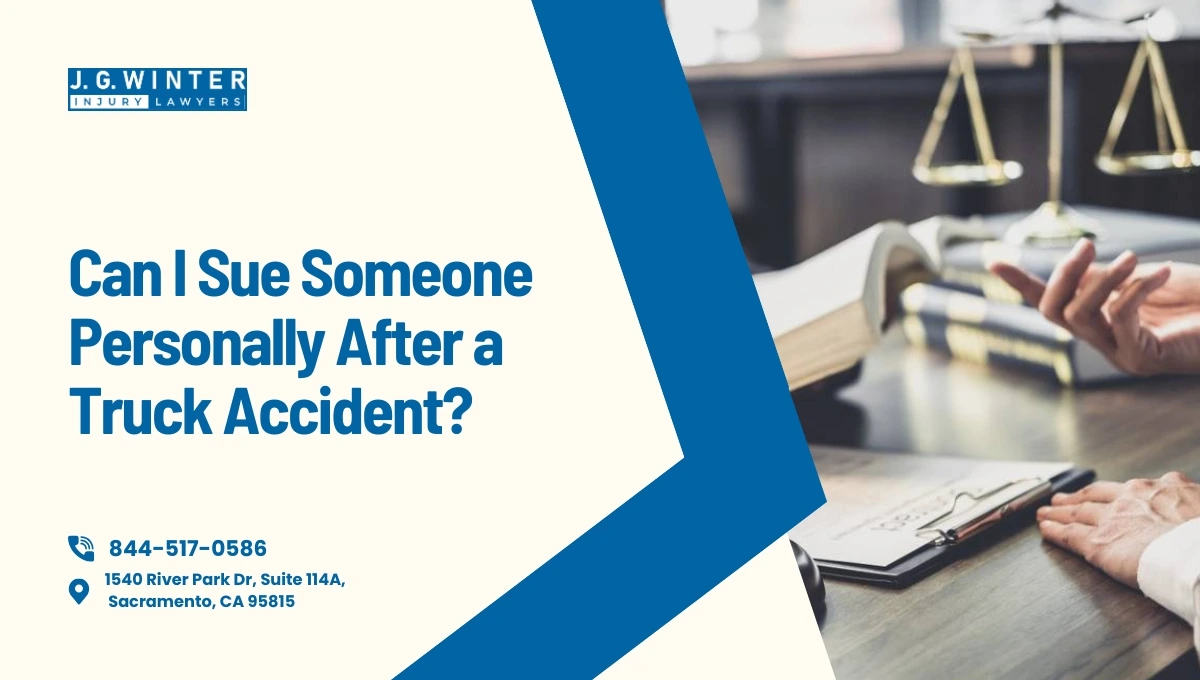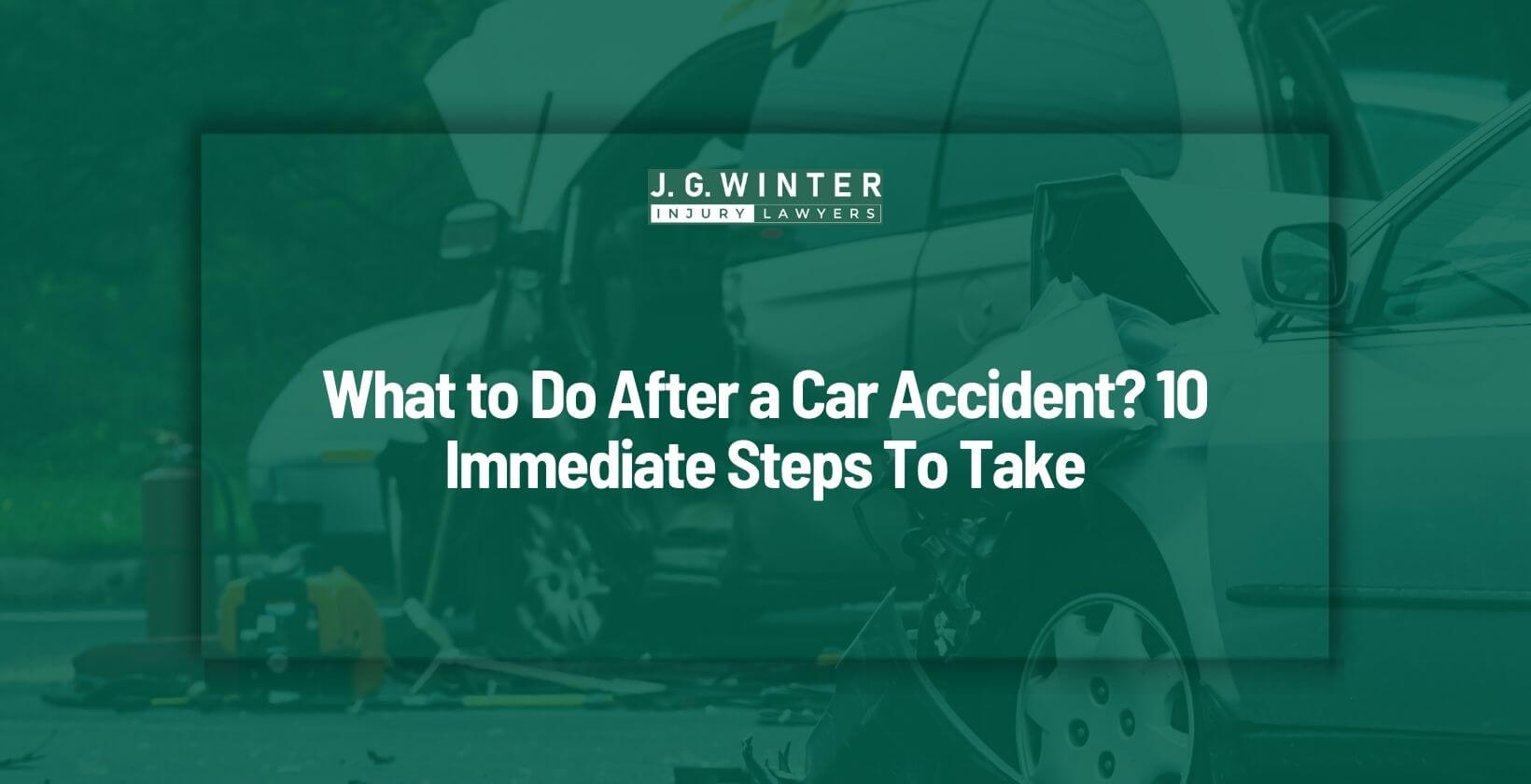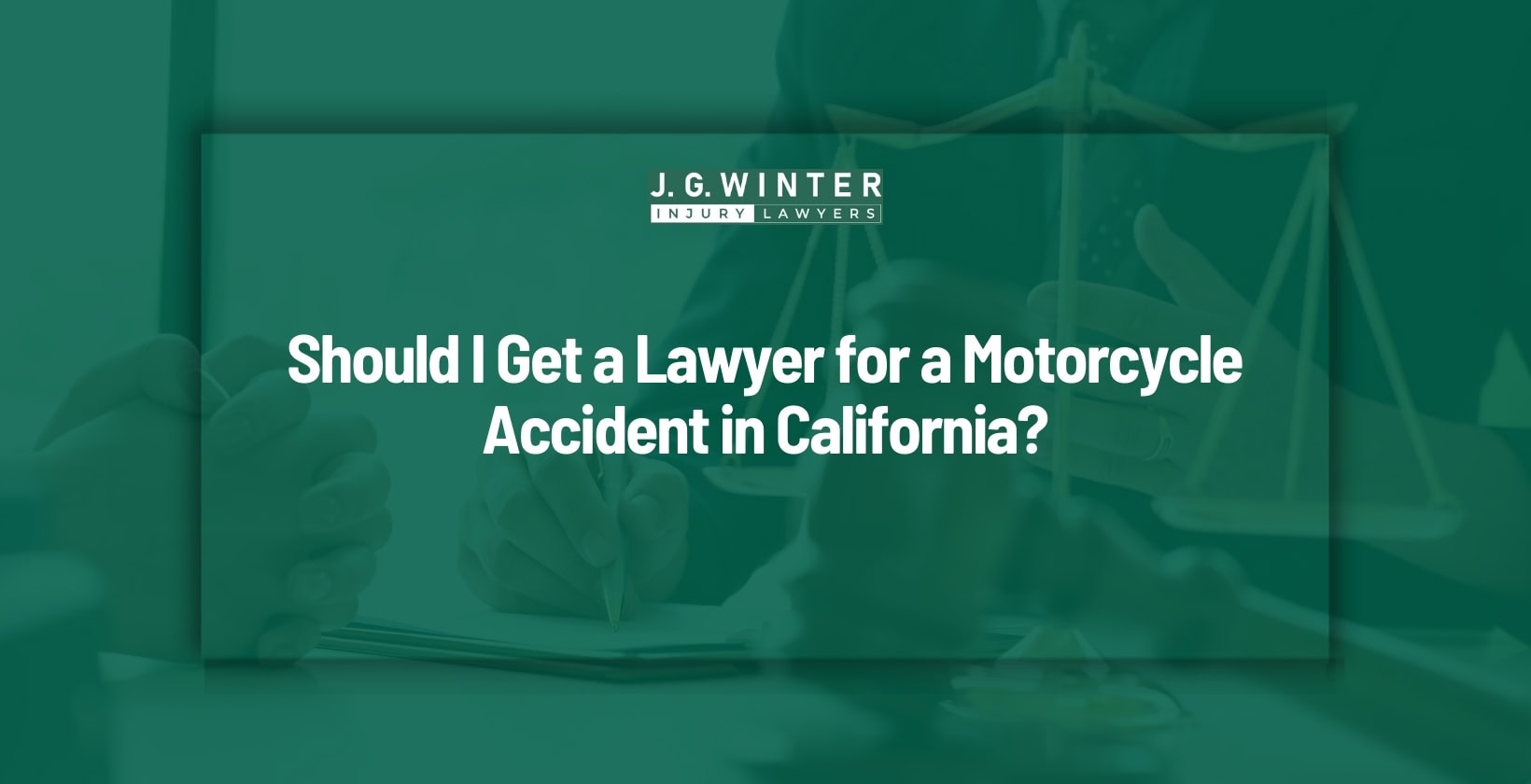If you’re wondering, “Can I sue someone personally after a truck accident?” the answer is not straightforward. It involves several important factors, including negligence, shared fault, and the specific personal injury laws in California. This guide is designed to help you navigate the complexities of truck accident liability. It will clarify who may be at fault and explain the potential legal hurdles you might face as you pursue justice.
Contact The Law Offices of JG Winter today for a free consultation and explore your legal options with compassionate, expert representation.
Understanding personal liability in truck accidents
In terms of truck accidents, liability can be shared among different parties, such as the truck driver, the trucking company, or even the manufacturers. Identifying who is responsible is a crucial step in your case. Proving liability is also no easy task, as it often requires substantial evidence to support your claims. Also, whether you’re negotiating with an insurance company or preparing to take your case to court, your level of understanding of the legal process can significantly impact your claim outcome.
What is Personal Liability in a Truck Accident?
Personal liability means being legally responsible for the harm caused by your actions. In truck accidents, different people can be held liable, including:
- Truck drivers: If a truck driver is reckless—like texting while driving or speeding—they can be responsible for any accidents they cause. For example, if tired drivers push themselves to keep going and cause a crash, they may be liable for the damage.
- Other drivers: Sometimes, other cars on the road can contribute to an accident. If a regular driver swerves into a truck’s lane and causes a collision, that driver might share some responsibility.
- Trucking companies: Companies that own trucks have to follow safety rules and keep their vehicles in good condition. If a trucking company ignores these rules or pressures drivers to work too many hours, they can be held responsible. For example, if a company tells drivers to skip breaks, they might be liable for any accidents caused by tired drivers.
- Parts manufacturers: If a truck accident happens due to a faulty part—like bad brakes or a defective tire—the company that made that part can be responsible. If it’s proven that the part was defective, they may have to face legal consequences.
- Cargo loaders: People who load cargo onto trucks also have a responsibility. If they don’t secure the cargo properly and it shifts during travel, causing an accident, they might be liable.
In summary, if a truck driver causes an accident through negligence, like driving tired or recklessly, they can be liable for the damages. Trucking companies may also share liability for ignoring safety regulations that put everyone at risk. This system of personal liability ensures that those responsible for accidents must answer for their actions.
Personal Injury Claims vs. Truck Accident Lawsuits
Navigating the truck accident lawsuit can be challenging, but you can seek different types of compensation under the existing laws.
- Personal Injury Claims: The first step is often to file a personal injury claim with the responsible party’s insurance. For instance, if you’re injured because a truck failed to stop, you’d seek compensation for medical bills, which include costs related to hospital visits and rehabilitation; lost wages, which cover earnings lost during your recovery; and property damage, which refers to the costs to repair or replace your vehicle.
- Truck Accident Lawsuits: If personal injury claims don’t lead to adequate compensation, you may need to pursue a truck accident lawsuit. This is common when negotiations fail, and insurance offers are insufficient, if wrongful death occurs, prompting family members to seek compensation for loss and expenses, or when punitive damages are in question, usually due to severe negligence.
- Wrongful Death Lawsuits: In cases of fatal accidents, family members can file wrongful death lawsuits. These claims can address funeral expenses and the emotional impact of the loss, providing some measure of financial support and closure.
Legal actions vary based on the lawsuit and the circumstances of the accident. While some can be resolved through negotiation, others require litigation. An experienced truck accident lawyer can guide you on the best options to pursue fair compensation.
Establishing fault and personal liability
Determining Negligence in a Truck Accident
To hold someone personally liable in a legal case, it’s essential to prove that their actions were negligent. This means showing four key elements:
- Duty of care: This refers to the responsibility of the at-fault party to act in a safe manner. For example, drivers are subjected to the duty of care, which can be clarified as following traffic laws and driving carefully so as not to cause harm to fellow drivers and the public.
- Breach of duty: This occurs when any party to the accident fails to perform in accordance with the legal responsibilities. Examples of a breach of duty include reckless behavior such as speeding, violating traffic signals, or driving intoxicated.
- Causation: You need to demonstrate that the negligent actions of the individual directly caused the accident. This means showing a clear link between what they did (or didn’t do) and the resulting incident.
- Damages: It is important for you to prove that you have suffered harm due to the accident. Here, harm can include financial harm, such as loss of money due to medical bills and inability to work,k and harm in the form of the trauma of getting into the accident.
To support your personal injury claim, gather evidence that can enhance your case. Useful materials might include:
- Police reports: These documents detail the specifics of the accident as recorded by law enforcement.
- Truck driver logs: If a commercial vehicle is involved, these logs can show the driver’s hours and conditions of operation.
- Maintenance records: Evidence that the vehicle was properly maintained can be crucial in proving safe operation.
- Surveillance footage: Video evidence from nearby cameras can provide a clear view of the incident.
- Eyewitness testimonies: Statements given by the people who actually saw the accident can strengthen your claim by providing additional perspectives.
By carefully establishing negligence and backing it up with solid evidence, you can effectively pursue a personal injury claim.
Comparative Fault: How It Affects Your Case
In California, the law operates under a principle called pure comparative negligence. This means that if you’re involved in an accident and it’s determined that you also have responsibility for the accident, you can still receive compensation for your injuries or damages. However, your entitlement may be adjusted based on your level of fault.
For instance, let’s say you are found to be 20% responsible for an accident. If your total damages amount to $20,000, your compensation would be reduced by your percentage of fault. In this case, you would receive $16,000 because 20% of $20,000 is $4,000, and that amount would be taken off your total.
This approach is designed to help the victims so that they can pursue compensation even when multiple parties contribute to the accident. It recognizes that accidents can be complex and that responsibilities can be shared, ensuring that you have the opportunity to recover some of the losses you’ve experienced, regardless of your level of fault.
Practical steps towards filing a truck accident lawsuit
If you find yourself involved in a truck accident, it is important to take action as soon as possible. Here’s a more detailed guide on what to do:
- Seek medical attention: Your body should be your top priority. Even if you feel fine, it’s essential to get checked by a medical professional. Document any injuries you sustain, as this information will be critical for your case.
- Call 911: Contacting emergency services is very important. After investigating the incident, the police will create an official report. This report is important for insurance claims and any potential legal action.
- Gather evidence: Take the initiative to collect evidence at the scene of the accident. This includes:
- Witness statements: Speak with anyone who saw the accident and get their contact information.
- Truck driver logs: If possible, ask for the truck driver’s logbook information, which can provide insights into their hours of service.
- Accident photos: Take pictures of the vehicles involved, any damage, road conditions, and traffic signs. Visual evidence can be invaluable.
- Consult a truck accident attorney: It’s wise to consult with an experienced lawyer who has handled similar cases. The lawyer can help with evaluating your case and making sure that you do not miss anything in the process of getting compensated.
- File a claim notice: After consulting with your attorney, you may need to file a claim with the insurance company. If negotiations do not yield a satisfactory result, you might need to start legal proceedings.
Settlement vs. Trial Outcomes
Most truck accident claims are resolved through settlements before reaching a courtroom. However, there are times when insurers may dispute liability or offer a settlement that is much lower than expected. In these cases, it may be necessary to take your case to trial.
A knowledgeable truck accident lawyer can navigate both negotiations and courtroom battles on your behalf, fighting to ensure you receive the fair compensation you deserve for your injuries and losses.
Compensation for truck accident victims
Victims of truck accidents can seek various forms of compensation that include:
- Economic damages: This covers tangible losses such as medical bills for both treatment and rehabilitation, wages during your absence from work, and property damage incurred during the accident.
- Non-economic damages: These damages account for intangible losses such as emotional pain or trauma from the loss of companionship, which affects personal relationships.
- Punitive damages: Awarded in cases of extreme negligence—such as those involving DUI—these damages serve to deter those responsible from committing the same act.
- Future medical costs: Compensation may also cover anticipated medical expenses if the injuries necessitate long-term care or rehabilitation.
- Future medical costs: Compensation may also cover anticipated medical expenses if the injuries necessitate long-term care or rehabilitation.
It is also important to note that how much you receive will be influenced by the severity of injuries, proof of negligence, lost earning capacity, and Insurance policy limits.
Why hire a truck accident attorney?
A truck accident lawyer provides expert legal help without any upfront costs, making it accessible to those who need it. If you’ve been in a truck accident, a truck accident lawyer can help you in several key ways:
- Insurance Negotiations: They are skilled at negotiating with insurance companies so that they won’t undervalue your loss and damages.
- Collecting Evidence: Your lawyer will gather important evidence, such as medical records and police reports, to support your case.
- Case Evaluation: They will help determine the value of your case during legal consultations, giving you a clearer idea of what to expect.
- Court Representation: If you can’t reach a settlement, they will represent you in court, making sure your rights are protected.
- Handling Paperwork: They will manage all the legal paperwork and court filings for you, ensuring everything is done correctly.
With these services, a dedicated truck accident lawyer can make the process easier to navigate, allowing you to focus on healing and recovery.
Contact J.G. Winter Law to learn more about personal liability.
At the Law Offices of J.G. Winter, our lawyers have expertise in legal processes involved in truck accidents, and we can assist you with recovering damages for medical expenses, lost income, and emotional suffering.
Whether you’re seeking compensation for injuries, dealing with loss, or facing other challenges due to a truck accident, our team is here to provide the support and legal expertise you need. With our no-win, no-fee approach, you can recover at ease while we fight for justice.
Reach out to us today to schedule a consultation and take the first step towards securing justice and compensation.
Can I Sue Someone Personally After a Truck Accident? : FAQ
How long do I have to file a lawsuit after a truck accident?
In California, the statute of limitations for personal injury lawsuits is two years from the accident date. If you miss this deadline, you may lose your right to pursue compensation.
What if the trucking company denies liability?
A truck accident attorney can gather evidence, such as truck driver logs and maintenance records, to establish fault and challenge the company’s denial.
Can I sue if I was partially at fault for the accident?
Yes. Under California’s comparative negligence law, you can still recover compensation, but your total amount will be reduced by your percentage of fault.
Take the Next Step
If you’ve been injured in a truck accident, don’t navigate the legal process alone. Contact JG Winter Law for a free consultation, and let us fight for the justice and compensation you deserve.


